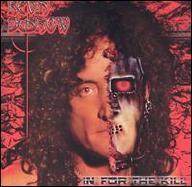Despite trouble securing a U.S. record deal, Quiet Riot did issue a pair of albums in Japan, 1977's Quiet Riot and 1978's Quiet Riot II. A U.S. deal never materialized, and Rhoads left the group in 1979 to join Ozzy Osbourne's solo band. DuBrow soldiered on, however, changing the group's name from Quiet Riot to...DuBrow. With Rhoads mentioning Quiet Riot in interviews as a member of the Ozzy band, interest was piqued, which increased further after Rhoads' tragic death in April 1982. Switching their name back to Quiet Riot, the group finally landed an ever-elusive U.S. record deal with Pasha/Sony. Now comprised of DuBrow, guitarist Carlos Cavazo, bassist Rudy Sarzo (who was a member of the band during the late '70s), and drummer Frankie Banali, Quiet Riot released Metal Health in March of 1983. With a sound that merged metal riffs with pop hooks and anthemic choruses, the album took a few months to catch fire. But it eventually did, on the strength of two hit singles -- Metal Health and a cover of Slade's Cum on Feel the Noize -- which sent Metal Health to the top of the Billboard album charts.
However, just as soon as Quiet Riot hit the big time, DuBrow seemed to revel in his wild/party animal persona -- according to a VH1 #Behind the Music special years later, he began using cocaine heavily, which only seemed to fuel his ego. As a result, this led to DuBrow lashing out at some of metal's biggest names in magazine articles (specifically, Mötley Crüe and Ozzy). This didn't sit well with the metal masses, and Quiet Riot's next release, 1984's Condition Critical, performed well below the mark Metal Health had set. After one more album, 1986's QR III, DuBrow was unceremoniously asked to leave the band that he had co-formed a decade earlier.
In the early '90s, DuBrow and Quiet Riot had patched up their differences, and beginning with 1993's Terrified, DuBrow was back as the group's frontman. In addition to touring/recording with Quiet Riot, the singer also appeared on tribute albums for other metal bands, and released a solo album in 2004, In for the Kill, which was comprised of cover songs of classic rock acts of the '70s. Sadly, on November 26, 2007, news broke that DuBrow had passed away. It was later determined that he had died a week earlier (on November 19), and that the cause was an accidental cocaine overdose. Despite being singled out as "the mouth that roared" in the music press, DuBrow was certainly a main reason for the "pop-metal" explosion of the mid- to late '80s (when such similarly styled-groups as Ratt, Cinderella, and Poison rose up the charts), which can be attributed directly to his work with Quiet Riot, and specifically, Metal Health. ~ Greg Prato, Rovi












